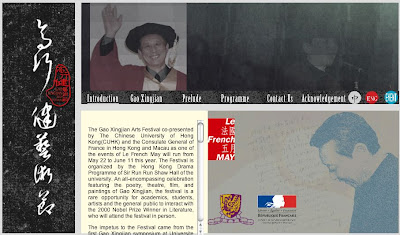
Gao Xingjian 高行健, Prix Nobel de littérature 2000, est à nouveau à l’honneur. Après l’inauguration à la Bibliothèque de l’Université de Provence d’un Espace de recherche et de documentation, c’est à Hong Kong que vont se dérouler des manifestations pour rendre hommage à son œuvre, le Gao Xingjian Arts Festival. Un site internet - en anglais et en chinois - entièrement consacré à l’événement fournit les informations relatives à toutes les activités qui se sont tenues et vont se tenir jusqu’au 1 juin 2008.
Les 28, 29 et 30 mai, aura lieu le colloque international organisé par The Chinese University of Hong Kong (CUHK), le Centre d'études français sur la Chine contemporaine (CEFC, Hong Kong), et l'Université de Provence, déjà annoncé sur ce blog et dont voici le détail
 Gao Xingjian and Chinese Aesthetics
Gao Xingjian and Chinese Aesthetics• « Ne pas avoir de -isme », un -isme pour un homme seul
Noël Dutrait 杜特萊, Université de Provence (Aix-Marseille I)
• Creative Exile and Chineseness
Gilbert C. F. Fong 方梓勳, The Chinese University of Hong Kong
• 後諾貝爾時期高行健的新思索
Liu Zaifu 劉再復, City University of Hong Kong
• Fission and Fusion:
Dynamic Tension of Chineseness in Gao Xingjian’s Literary Writing
Ming Jian 簡明, William Paterson University, New Jersey, USA
• 逃亡·隱逸·禪 — 讀高行健作品隨想
Tian Benxiang 田本相 , China Arts Academy, Beijing, China
• Reverberations of Zhuangzi in Gao Xingjian’s Aesthetics
Mabel Lee 陳順妍, University of Sydney, Australia
• 高行健與莊子
Zhang Yinde 張寅德, Université Paris III, France
 The Aesthetics of Fiction
The Aesthetics of Fiction• Modernity Overcome? Gao Xingjian and Kenzaburo Oe
Sebastian Veg 魏簡, CEFC, Hong Kong
• 多人稱的實驗與多聲部構成的嘗試 ── 論高行健的創作特點
Iizuka Yûtori 飯塚容, Chûo University, Japan
• 試論高行健小說裏第二人稱的運用
Ngai Ling Tun 危令敦 , The Chinese University of Hong Kong
• From A Preliminary Discussion of the Art of Modern Fiction to Soul Mountain
and One Man’s Bible: Gao Xingjian’s Use of
Narrative Patterns to Rethink China
Nicoletta Pesaro, Università Ca' Foscari Venezia, Italy
• 從«靈山»最末幾章中“雪”的意像說起
Xiao Yingying 蕭盈盈, Université Paris VII, France
• 「護衛者」──《河那邊》
Wong Juen Kon 王晉光/Ng Hau Wan吳巧雲, The Chinese University of Hong Kong
• 漸行漸濃的禪意與佛境 ── 從《靈山》走到《八月雪》
Liu Chunying 劉春英, Jinan University, Guangzhou, China
 The Aesthetics of Drama
The Aesthetics of Drama • 表演三重性:一種美學?還是一種技法?
Lin Kehuan 林克歡 , Former Director, China Youth Theatre, Beijing, China
• Framing Chineseness:
The Representations of Contemporary China in Gao Xingjian's Plays
Quah Sy Ren 柯思仁, Nanyang Technological University, Singapore
• Asian Modern Theatre with Universality by Gao Xingjian
Sookyung Oh , Hanyang University, Seoul, Korea
• 從此岸到彼岸:高行健戲劇的美學境界
Hu Zhiyi 胡志毅, Zhejiang University, Hangzhou, China
• 完全戲劇:豐富中的貧困—從高行健的作品看戲劇的文學意義
Shi Xusheng 施旭昇, Communication University of China, Beijing, China
• Absurdism, Brechtianism and Ritualism
in the Early Works of Gao Xingjian
Luk Yun Tong 陸潤棠, Fo Guang University, Taiwan
 The Plays
The Plays• Politics in Rituals: Gao Xingjian’s Escape
Law Ching 羅菁, Hong Kong Baptist University
• On the Margins of Both East and West: Nocturnal Wanderer
Wah Guan Lim 林華源, Princeton University, New Jersey, USA
• The Religious and the Autobiographical: Snow in August in Taipei
Alex Huang, Pennsylvania State University, USA
• 《叩問死亡》:叩問中性演員的可能性
Shelby K. Y. Chan 陳嘉恩, The Chinese University of Hong Kong
• A Tentative Quest of Gao Xingjian's The Man Who Questions Death
Hwang Mei-shu 黃美序, Chinese Culture University, Taiwan
• The Franco-Sino-Anglo Gao in Ballade Nocturne
Claire Conceison 康開麗 , Tufts University, Boston, USA
 Nous comptons naturellement sur Noël Dutrait pour nous rendre compte de cette manifestation savante qui marquera sans doute une étape importante dans les recherches sur Gao Xingjian, et des développements sur ses à-côtés, dont les points forts seront les créations d'œuvres dramatiques d'un genre nouveau. (P.K.)
Nous comptons naturellement sur Noël Dutrait pour nous rendre compte de cette manifestation savante qui marquera sans doute une étape importante dans les recherches sur Gao Xingjian, et des développements sur ses à-côtés, dont les points forts seront les créations d'œuvres dramatiques d'un genre nouveau. (P.K.)



